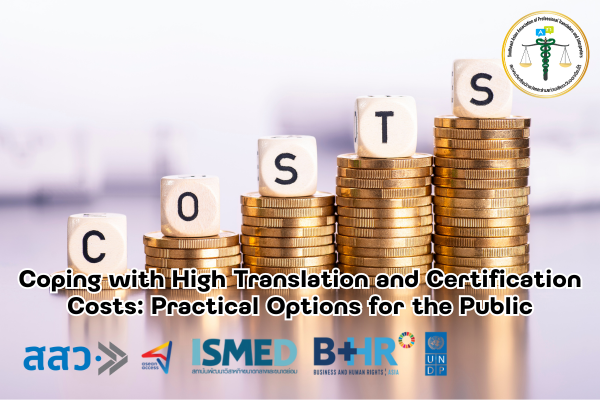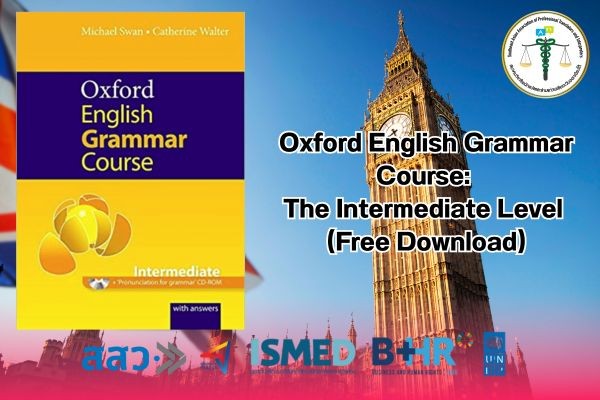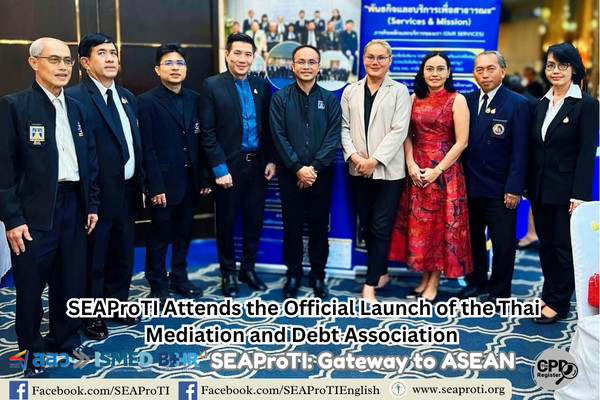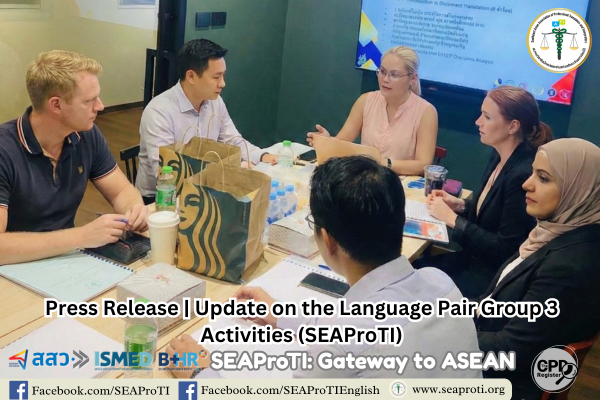Coping with High Translation and Certification Costs:
Practical Options for the Public
11 April 2025, Bangkok – In today’s world, the demand for official document use in both domestic and international settings has significantly increased. As a result, translation and translation certification have become essential processes that many cannot avoid. However, the relatively high costs of these services can present a burden to the general public. This has led to the search for cost-effective alternatives that still ensure legal compliance and professional standards.
1. The Right to Self-Translate Government-Issued Documents
Under current practices, members of the public are allowed to translate certain official documents on their own in order to request legalization from the Department of Consular Affairs, Ministry of Foreign Affairs—particularly when such documents are intended for use abroad.
Examples of documents eligible for self-translation include:
-
National ID cards
-
Birth certificates
-
Household registration documents
-
Marriage certificates
-
Death certificates
Once translated, these documents can be submitted for legalization at the Department of Consular Affairs, with a fee of 200 THB per stamp under regular service and 400 THB per stamp for expedited service. These types of documents are typically required only for international use.
2. Using Certified Translators and Translation Certification Providers
For documents with technical, legal, medical, or otherwise complex content, it is strongly recommended to seek professional services. This is particularly crucial when documents must be submitted to government agencies, courts, or corporate entities that require high levels of accuracy and credibility.
Recommended professionals include:
-
Certified Translators
-
Translation Certification Providers
These professionals are licensed by the Southeast Asian Association of Professional Translators and Interpreters (SEAProTI). They are officially registered with the Department of Provincial Administration, Ministry of Interior, and publicly announced in the Royal Thai Government Gazette. This registration enhances the credibility and legal acceptance of the translations they certify.
Domestic institutions that accept certified translations without additional consular or notarial processes include:
-
Thai courts
-
Royal Thai Police and Investigating Officers
-
Office of the Attorney General
-
Ministry of Interior
-
Ministry of Commerce
-
Ministry of Public Health
-
Private sector entities and listed companies
- And many other users, depending on their purposes.
3. Service Fees and Accessibility
Translation and certification services offered by professional translators generally follow the fee guidelines recommended by SEAProTI to ensure affordability. When dealing with individual certified translators, fees can typically be negotiated directly. However, if the service is provided by a corporate member of SEAProTI, the cost may vary depending on internal pricing policies and agreements.
Conclusion
While the costs of translation and certification may be burdensome in certain cases, individuals still have the right to translate specific documents themselves for legalization. Moreover, seeking services from certified professionals ensures that documents are reliable, legally valid, and professionally rendered—without always requiring verification from the Department of Consular Affairs or a notary public. Promoting awareness and understanding of these options empowers the public to make informed decisions and manage costs while maintaining document quality for legal and international use.
SEAProTI’s certified translators, translation certification providers, and certified interpreters:
The Southeast Asian Association of Professional Translators and Interpreters (SEAProTI) has officially announced the criteria and qualifications for individuals to register as “Certified Translators,” “Translation Certification Providers,” and “Certified Interpreters” under the association’s regulations. These guidelines are detailed in Sections 9 and 10 of the Royal Thai Government Gazette, issued by the Secretariat of the Cabinet under the Office of the Prime Minister of the Kingdom of Thailand, dated July 25, 2024, Volume 141, Part 66 Ng, Page 100.
To read the full publication, visit: the Royal Thai Government Gazette
ทางเลือกของประชาชนต่อค่าบริการแปลและรับรองการแปลเอกสารที่มีราคาสูง: แนวทางปฏิบัติและข้อพึงทราบ
11 เมษายน 2568, กรุงเทพมหานคร – ในยุคที่ความต้องการใช้เอกสารทางราชการเพื่อดำเนินการทั้งภายในประเทศและระหว่างประเทศเพิ่มมากขึ้น การแปลและรับรองเอกสารกลายเป็นกระบวนการสำคัญที่ประชาชนหลีกเลี่ยงไม่ได้ อย่างไรก็ตาม ค่าบริการแปลและรับรองคำแปลที่มีราคาค่อนข้างสูงในบางกรณี ทำให้หลายภาคส่วน โดยเฉพาะประชาชนทั่วไป ต้องแสวงหาทางเลือกที่สามารถลดภาระค่าใช้จ่ายได้โดยยังคงไว้ซึ่งความถูกต้องตามหลักกฎหมายและมาตรฐานวิชาชีพ
1. สิทธิของประชาชนในการแปลเอกสารราชการด้วยตนเอง
ตามหลักปฏิบัติปัจจุบัน ประชาชนสามารถแปลเอกสารราชการด้วยตนเอง เพื่อใช้ในการขอรับรองนิติกรณ์เอกสาร (Legalization) จากกรมการกงสุล กระทรวงการต่างประเทศ โดยเฉพาะในกรณีที่เอกสารดังกล่าวมีวัตถุประสงค์เพื่อนำไปใช้อ้างอิงในต่างประเทศ
ตัวอย่างเอกสารที่ประชาชนสามารถแปลเองได้
-
บัตรประจำตัวประชาชน
-
สูติบัตร
-
ทะเบียนบ้าน
-
ทะเบียนสมรส
-
มรณบัตร
โดยเมื่อดำเนินการขอรับรองเอกสารดังกล่าวที่กรมการกงสุล จะมีค่าใช้จ่าย 200 บาทต่อการประทับตรารับรองในวันทำการปกติ และ 400 บาทต่อชุดในกรณีขอรับบริการเร่งด่วน และค่าบริการรับรองการแปลเอกสารจากศาล 400 ต่อหน้า ทั้งนี้ เอกสารเหล่านี้จะต้องใช้ในบริบทระหว่างประเทศเป็นหลัก
2. การเลือกใช้บริการนักแปลรับรองและผู้รับรองการแปล
สำหรับเอกสารที่มีความสำคัญ หรือมีเนื้อหาทางเทคนิค กฎหมาย หรือการแพทย์ ที่ซับซ้อน การแปลโดยนักแปลวิชาชีพจึงเป็นทางเลือกที่เหมาะสมและเชื่อถือได้ โดยเฉพาะอย่างยิ่งในกรณีที่ต้องใช้เอกสารในประเทศไทย หรือในหน่วยงานที่กำหนดมาตรฐานสูง
กลุ่มผู้เชี่ยวชาญที่แนะนำ
-
นักแปลรับรอง (Certified Translators)
-
ผู้รับรองการแปล (Translation Certification Providers)
บุคคลทั้งสองกลุ่มนี้มีใบอนุญาตประกอบวิชาชีพจากสมาคมวิชาชีพนักแปลและล่ามแห่งเอเชียตะวันออกเฉียงใต้ (SEAProTI) และจดทะเบียนอย่างเป็นทางการกับกรมการปกครอง กระทรวงมหาดไทย รวมถึงมีรายชื่อเผยแพร่ในราชกิจจานุเบกษา อันเป็นหลักฐานทางกฎหมายที่เพิ่มความน่าเชื่อถือของงานแปล
การใช้บริการจากนักแปลรับรองและผู้รับรองการแปลที่ขึ้นทะเบียนกับสมาคมจึงเป็นทางเลือกที่คุ้มค่าและสะดวก โดยเฉพาะอย่างยิ่งเมื่อเอกสารต้องใช้ในหน่วยงานราชการ องค์กรระหว่างประเทศ หรือบริษัทในตลาดหลักทรัพย์
หน่วยงานในประเทศที่สามารถใช้เอกสารแปลได้โดยไม่ต้องผ่านกรมการกงสุลหรือ Notary Public
-
ศาลไทย (ทุกระดับ)
-
สำนักงานตำรวจแห่งชาติ และพนักงานสอบสวน
-
สำนักงานอัยการ
-
กระทรวงมหาดไทย
-
กระทรวงพาณิชย์
-
กระทรวงสาธารณสุข
-
หน่วยงานภาคเอกชนทั่วไปและบริษัทจดทะเบียนในตลาดหลักทรัพย์
- และผู้ใช้อื่น ๆ อีกมากมาย ตามวัตถุประสงค์ของผู้ใช้
3. อัตราค่าบริการและการเข้าถึง
ค่าบริการแปลและรับรองการแปลโดยทั่วไปควรอยู่ในระดับที่สมเหตุสมผลและเข้าถึงได้ โดยอิงตามอัตราที่แนะนำโดยสมาคม SEAProTI สำหรับนักแปลอิสระ (บุคคลธรรมดา) ซึ่งโดยมากจะยืดหยุ่นและสามารถเจรจาได้โดยตรง อย่างไรก็ตาม หากเป็นสมาชิกประเภทนิติบุคคลของสมาคม ค่าใช้จ่ายอาจแตกต่างกันตามเงื่อนไขที่ตกลงกันโดยตรงกับผู้ให้บริการ
บทสรุป
แม้ค่าบริการในการแปลและรับรองเอกสารอาจเป็นภาระต่อประชาชนในบางกรณี แต่ก็มีแนวทางที่เปิดโอกาสให้ประชาชนสามารถดำเนินการด้วยตนเองได้อย่างถูกต้องตามหลักกฎหมาย พร้อมกันนี้ การเลือกใช้บริการจากนักแปลที่ได้รับการรับรองอย่างถูกต้อง ก็เป็นอีกทางเลือกหนึ่งที่ช่วยให้มั่นใจในคุณภาพของงานแปลและความน่าเชื่อถือของเอกสาร โดยไม่จำเป็นต้องเสียค่าใช้จ่ายเพิ่มเติมกับหน่วยงานกลาง เช่น กรมการกงสุล หรือ Notary Public ในบางบริบท
การส่งเสริมความรู้และสร้างความเข้าใจในกระบวนการนี้ จึงถือเป็นประโยชน์อย่างยิ่งต่อการคุ้มครองสิทธิของประชาชน และการยกระดับมาตรฐานของงานแปลในประเทศไทย
เกี่ยวกับนักแปลรับรอง ผู้รับรองการแปล และล่ามรับรองของสมาคมวิชาชีพนักแปลและล่ามแห่งเอเชียตะวันออกเฉียงใต้
สมาคมวิชาชีพนักแปลและล่ามแห่งเอเชียตะวันออกเฉียงใต้ (SEAProTI) ได้ประกาศหลักเกณฑ์และคุณสมบัติผู้ที่ขึ้นทะเบียนเป็น “นักแปลรับรอง (Certified Translators) และผู้รับรองการแปล (Translation Certification Providers) และล่ามรับรอง (Certified Interpreters)” ของสมาคม หมวดที่ 9 และหมวดที่ 10 ในราชกิจจานุเบกษา ของสำนักเลขาธิการคณะรัฐมนตรี ในสำนักนายกรัฐมนตรี แห่งราชอาณาจักรไทย ลงวันที่ 25 ก.ค. 2567 เล่มที่ 141 ตอนที่ 66 ง หน้า 100 อ่านฉบับเต็มได้ที่: นักแปลรับรอง ผู้รับรองการแปล และล่ามรับรอง

























